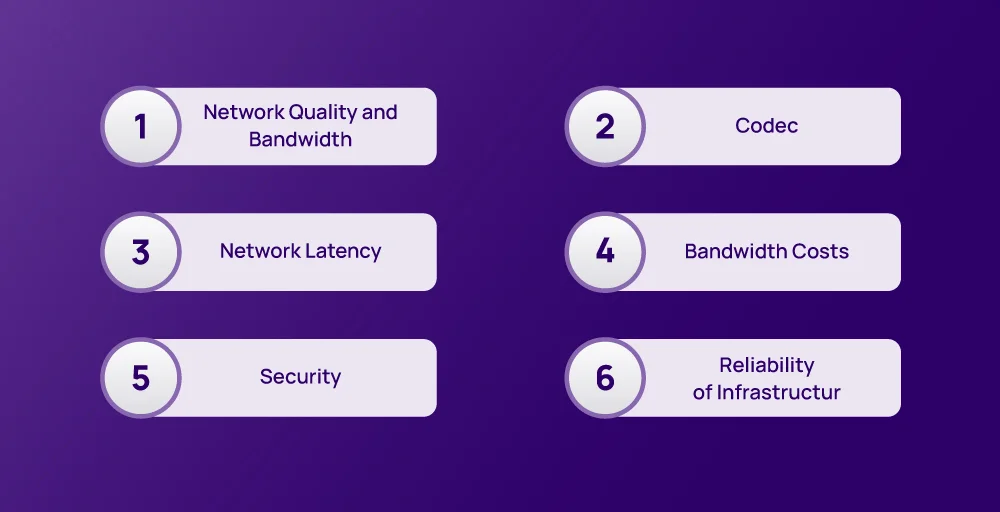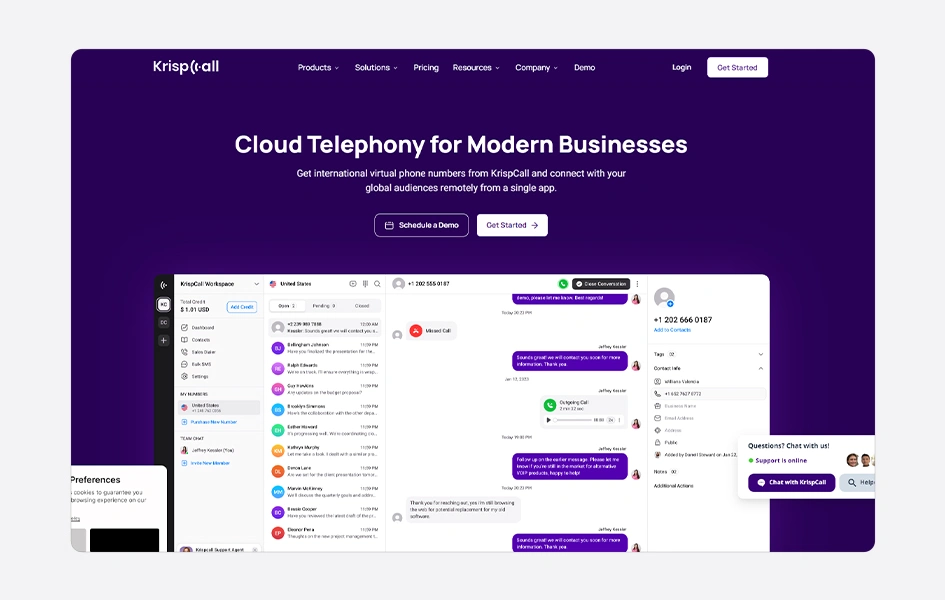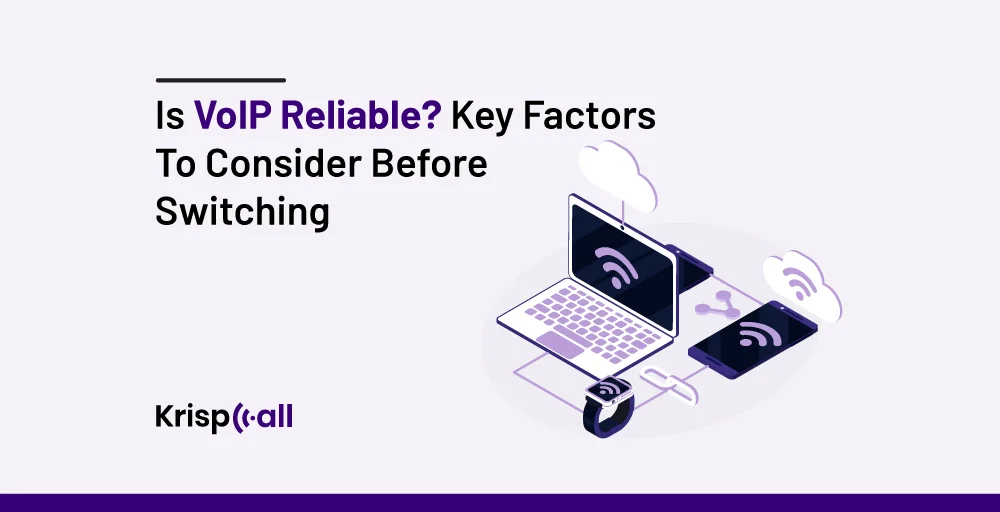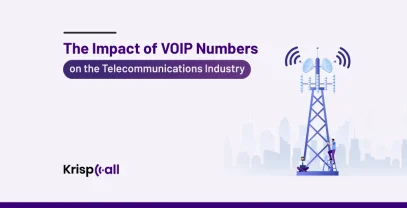VoIP, or Voice over Internet Protocol, is being widely used by businesses these days. And many people are willing to switch from traditional to VoIP 🙂due to its several advanced features and benefits.
But the one question always arises- whether it is reliable or not. 🤔
This guide will answer the question of whether Is VoIP reliable or not. Also, look out for the key factors to consider before switching from traditional to VoIP.
🔑 KEY HIGHLIGHTS
- Voice over Internet Protocol, or VoIP, is a technology that allows you to make and receive calls over the Internet.
- Before switching to VoIP from traditional phone systems, consider communication database, security, pricing, bandwidth, and features.
- The reliability of VoIP is mainly influenced by network quality and bandwidth, codec efficiency, and network latency.
- KrispCall stands out as a top VoIP solution, addressing contemporary challenges and providing a plethora of valuable options for both personal and business use.
What is VoIP?

Voice over Internet Protocol (VoIP) is a technology that allows you to make and receive calls over the Internet. Using an internet connection, you can easily initiate phone calls using your preferred devices, such as a PC, smartphone, and particular VoIP Phones. VoIP gives you the flexibility to call anywhere.
VoIP services convert voice into digital signals that travel over the Internet and reach the recipient’s destination. It provides a range of advanced features that enhance the smoothness of your calls. Here are some of the key features 👇:
- Call Forwarding: This feature allows you to redirect incoming calls to another phone number based on pre-defined rules. For instance, you can easily forward all calls to your voicemail after business hours.
- Call Queueing: With the call queueing feature, a virtual waiting room for incoming callers can be easily created. All callers are placed in a holding pattern when all your agents are unavailable at that moment.
- Call Transfer: This feature enables users to transfer ongoing calls to another phone number within your VoIP system. This is helpful when a call requires the expertise of a different agent or needs to be escalated to a supervisor.
Is VoIP Reliable for Business?
Yes, VoIP is reliable for businesses. Many factors contribute to its high reliability throughout the day. Three key technologies stand out for strengthening VoIP reliability 👇.
Developments in Internet technology
Due to high-speed broadband internet, VoIP’s reliability has increased dramatically in recent years. Cable, fiber, and even 5G Wi-fi connections use far more consistent bandwidth with much less latency. As a result, VoIP calls are crystal clear with no drops or network jitter.
Cloud-based infrastructure
Instead of connecting from an on-premise system that might go dark in an emergency, VoIP providers have redundant, geographically distinct data centers continually linked via tier-one fiber networks. If an outage occurs at one data center, calls are transferred between locations automatically to maintain the maximum percent of uptime guarantee.
Comparing VoIP with landlines
Traditional landlines once ruled out the communication system. But now VoIP has taken over in terms of more reliable and unmatched call quality. Users can also make a call using their preferred device with VoIP while traditional landlines have to use a particular phone.
VoIP’s reliability has reached and even exceeded that of traditional landline telephones due to several key advantages 👇:
- Uptime and redundancy: A reputable VoIP provider has a redundant data center. In case of any downtime or other issues, all calls are rerouted through this data center. On the other hand, traditional landlines heavily rely on physical structure, making it hard to bypass during outages.
- No need for expensive hardware installations: VoIP is a cost-effective solution for contacting loved ones and business partners. You don’t have to install and maintain expensive hardware, significantly reducing your hardware and maintenance costs.
- International calls: No matter where you are, you can easily make international calls with lower charges with VoIP. You just need a stable internet connection. Meanwhile, with landlines, per-minute rates for dialing out of state or country are often exceptionally high.
Factors that Affect VoIP Reliability
These are some of the key factors that affect your VoIP reliability 👇:

1. Network Quality and Bandwidth
Just Like any other internet-based application, VoIP relies heavily on a stable internet connection. You might experience high call quality on a stable internet connection. But If you have insufficient bandwidth (upload and download speeds), it cannot handle the data traffic of VoIP calls, eventually leading to choppy audio and lag.
Similarly, a poor internet connection that constantly outages can disrupt call clarity, ultimately leading to dropped calls.
2. Codec
Imagine a codec as a translator for your voice. Just like different translators work at varying speeds and accuracies, different codecs compress and decompress voice data differently. This affects both the quality of your call and how much internet bandwidth you use. Choosing the right codec is like finding the right balance.
High-quality ones give you super clear audio, but they gobble up more bandwidth. On the other hand, the lower-quality ones save on bandwidth, but your voice might not sound as sharp.
3. Network Latency
Latency usually occurs when the distance between the receiver and the sender is long and also may occur due to poor network conditions. If the distance between you and the receiver increases, then the latency will also increase. Moreover, latency depends on the number of routers your packets need to visit before reaching the receiver.
4. Bandwidth Costs
There is no doubt that VoIP calls often boast significant cost savings. However, always be mindful of potential hidden charges. These costs always depend on your VoIP provider and calling plan.
Remember that excessive bandwidth usage during calls could translate into higher charges. To avoid unexpected expenses, you must carefully evaluate your call volume and choose a plan that aligns with your needs.
5. Security
Securing your data can be a challenging task since VoIP calls travel over the Internet. An unauthorized person might access to your call. Therefore, always ensure your VoIP services provider offers robust encryption protocols to safeguard your communication from unauthorized interception.
This ultimately helps you to protect sensitive business conversations and customer data from falling into the wrong hands.
6. Reliability of Infrastructure
The underlying infrastructure of your VoIP provider is the foundation of your VoIP experience. Regular maintenance, redundancy measures (such as backup systems), and geographically distributed servers all contribute to a more reliable and resilient VoIP service.
A well-maintained infrastructure ensures minimal downtime and uninterrupted communication for your business.
Key Factors to Consider Before Switching to VoIP from Traditional Phone System
Here are some tips to consider before switching to VOIP from a traditional phone system:
Communication Database
A provider should offer Voice over Internet Protocol that enables you to record call logs, voicemails, and contact information. In this regard, the provider should have a comprehensive and easy-to-use communication database that records all the data and has a search feature for call histories.
Additionally, the database should automatically transcribe the voicemails and smoothly integrate with CRM or other business software.
Security
A VoIP provider must use cutting-edge encryption protocols such as SRTP and TLS, among many others, to prevent interception and other unauthorized access to your business communications.
In terms of security, you must also investigate your provider’s firewall and intrusion detection systems and the number of regular security audits conducted to guarantee the confidentiality and integrity of your data.
Evaluate the Pricing Components
Pay attention to the pricing plan of a VoIP provider, including set-up, the subscription monthly or annual subscription cost, and additional charges for other functionalities or usage. Check the pricing model of such services, including by-user basis, by the minute of call duration, or a flat rate of unlimited usage.
Check if the pricing correlates with your business application budget and consider potential savings on a phone system you are currently using, such as a long-distance call or an international one.
Network & Bandwidth
Analyze your current network infrastructure and internet bandwidth to verify whether they can accommodate the additional data traffic generated by VoIP communications. Review the VoIP provider’s suggestions regarding network requirements, such as the minimum amount of bandwidth, QoS configurations, and other network performance tuning methods.
Upgrade your network or internet connection if the current setup is unsustainable. You may face difficulties with your calls because of issues such as packet loss or drops in the number of ongoing calls.
Features
Identify the basic features your business needs, including call forwarding, voicemail-to-email, mobile integration, and video conferencing. Determine whether the VoIP provider offers the key features to improve communication and productivity.
Likewise, you should also learn about some supplementary features that other businesses might require in the future. Some might include call recording, automated attendant, and advanced call routing.
Reliability
Choose VoIP providers with a history of uptime and reliability backed by service level agreements to ensure minimal downtime or quick resolution of any issues.
Review their disaster recovery and business continuity provisions to ensure your communication services continue functioning despite unexpected disturbances or outages. Verify that your VoIP provider has redundant data centers, backup power, and failover capabilities to guarantee business continuity.
Customer Support
Evaluate if the VoIP provider’s customer support is adequate – Does the VoIP vendor offer 24/7 support, are there any options for local support, or are there any other factors about their responsiveness to address technical challenges? Additionally, ask about the vendor’s provider training, materials, and resources to aid in smoothly acquiring and adopting the new system.
Opt for a provider with extensive support options that cater to the business’s unique communication needs, including online resources, a knowledge base, and account management.
Switching to VoIP? Choose KrispCall for Top-tier Reliability and Quality

Upgrading from traditional to VoIP unlocks a treasure trove of benefits for your business. However, reliable communication is essential, as your brand value and reputation might be damaged due to dropped calls or audio woes. Therefore, choosing the best VoIP provider is essential.
Choose KrispCall as your VoIP partner. It ensures uninterrupted calls with unmatched call quality and offers advanced features such as IVR, automatic call distribution, global calling, call barging, shared number, call transfer, and a unified callbox.
Besides that, KrispCall seamlessly integrates with your existing tools and prioritizes security with various encryption technologies. Don’t settle for less – choose KrispCall and focus on building relationships while it handles the technical side of flawless communication.
➡️ Book a free demo now and discover how KrispCall’s commitment to reliability can elevate your business communication.
Conclusion
VoIP technology has undergone significant transformation and provides businesses and individuals with a dependable and efficient mode of communication. Improvements in internet technology, cloud-based infrastructure, and better call quality have replaced traditional landline phone systems for VoIP. Before transitioning, network quality, security, and infrastructure stability are factors to consider.
Combined with these factors, a competent VoIP provider company like KrispCall will ensure businesses have a consistently good experience, making the most out of the opportunity while increasing their productivity and efficiency.
FAQs
Is VoIP better than the PBX phone system?
VoIP is better than PBX systems because it provides more flexibility: people can make and receive calls anywhere with an internet connection. Moreover, VoIP has many more features and integrations with other business tools.
How reliable is VoIP for making emergency calls?
VoIP can be accurate, but everything is up to your internet and service provider. Many respected services provide measures like E911 support and redundant infrastructure to increase reliability.
Is VoIP Reliable for all types of business?
VoIP is reliable for all types of business, but its reliability depends on the company. Critical companies may require additional measures, such as redundant providers, for factor-level connections. In all aspects, VoIP is reliable, provided you have a stable set-up and quality provider.





